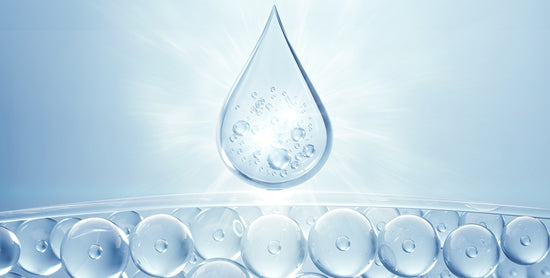Ever wondered ‘what is the difference between psoriasis and eczema?’ You’re not alone. If you have a patch or red, irritated skin, you might be wondering if it’s eczema vs psoriasis. So here’s everything you need to know about the difference between psoriasis and eczema.
Is it Eczema or Psoriasis?
If you have a patch of skin that’s itchy, irritated and red, you want to know whether it’s psoriasis vs eczema. Here’s what to look for:
What does psoriasis look like?

Psoriasis patches are usually well-defined, scaly patches with underlying redness. Psoriasis scales or plaques are usually raised, thick and built up, compared to patches of eczema. Depending on your skin tone, psoriasis patches can look silver, white or red.
Psoriasis can appear anywhere, but usually shows up on the outer areas of the feet, palms, lower back, scalp, eyelids, ears, nose, buttocks and nails. While these outbreaks can happen at any age, psoriasis typically first appears at 20 to 30 years old or 50 to 60 years old.
What does eczema look like?

Eczema patches are poorly-defined red, irritated areas of skin that can become easily broken and weep clear fluid when you scratch them. On fair skin, eczema appears red, while on darker skin it looks grey. Patches of eczema can have fine scales as well.
While eczema can affect people of any age, it often appears before the age of five. Yes, that means babies can get eczema. It often shows up on their back, face, torso, feet and hands. In children, eczema usually appears in areas of joint flexion, such as the elbows, backs of the knees, wrists, neck folds and ankles. In adults, eczema is most common on the hands, face and neck, but it can also show up in other areas.
What is the difference between psoriasis and eczema?
Both eczema and psoriasis skin diseases involve the human immune system. This doesn’t automatically classify them as autoimmune diseases though, as there can be other causes for both.
The biology of psoriasis
If you have psoriasis, your immune system has become overactive, leading to an increased rate of cell growth. These cells pile up on your skin’s surface creating plaques, which look like scaly, dry flakes that are often painful. Often psoriasis is genetic, meaning it’s inherited from family.
The biology of eczema

Eczema is different, and more linked to your immune system’s triggers and responses. If you have eczema, you’re more likely to have an over-reactive immune system. When you come into contact with triggers either inside or outside the body, an overactive inflammatory response gets activated.
Some research also shows that a mutated gene can cause people with eczema to have a compromised skin barrier. So, your skin is more prone to dryness and irritation when you come into contact with certain soaps, fragrances, fabrics and allergens like dust and pollen. Family history also influences eczema prevalence.
Psoriasis vs Eczema: Do They Itch?
Does eczema always itch?
Yes, eczema almost always itches. Anyone with eczema knows the incredible, inescapable itch associated with the disease. Most people find this itch intensifies at night, and worsens with certain clothing and fabrics they wear, plus with heat and dry climates.
Does psoriasis itch?
Psoriasis does not necessarily itch. Psoriasis can be very itchy for some people, but not for others. Many people describe psoriasis as feeling more like burning on their skin, rather than itching.
Eczema vs Psoriasis Treatments: What to Look For

Now you know eczema and psoriasis have some similarities, but they’re actually pretty different. This means you need different medical-grade skincare to manage your symptoms, depending on which skin disease you have. If you have eczema, you'll need specific medical-grade ingredients to create real difference for your skin. The same goes for psoriasis. And if your child has a skin condition, look for the 'pediatrician approved' stamp on any psoriasis cream or eczema cream for kids.
Depending on severity, topical steroids are sometimes prescribed for both eczema and psoriasis sufferers. However, these treatments come with their own potentially negative side effects. Because of this, steroid-free options are becoming increasingly popular. Scientists have discovered other skin-saving ingredients like glycolipids, which don’t have the same side effects as steroids.
How to choose the best eczema cream
An effective eczema cream must contain medical-grade ingredients that are proven, in real consumer trials, to ease the symptoms of eczema. Some great examples of effective ingredients include:
- 1% Colloidal oatmeal as an active ingredient. Colloidal oatmeal helps strengthen your skin’s natural barrier and calm inflammation.
- Glycolic acid. Glycolic acid is an AHA that helps keep your skin moisturized while shedding dry skin cells typically found with eczema.
Choosing the best psoriasis cream
Psoriasis burning pain relief is one of the main symptoms you need your psoriasis cream to soothe. Look for creams with powerful ingredients that help calm psoriasis, while also reducing the scale, redness and itch. A top ingredient example is:
- 2% Salicylic acid as an active ingredient. Salicylic acid is an exfoliant that reduces flaking and scaling, while also calming psoriatic skin.
Eczema vs Psoriasis: Medical Grade Skincare Ingredients You Need for Managing Both
We know colloidal oatmeal is great for eczema, and salicylic acid helps with psoriasis, but your treatment needs more than just these ingredients to give you real, lasting relief from your symptoms.
HYDROSURF™ Glycolipid Technology for Psoriasis and Eczema
Luckily, there’s a new steroid-free option that can create real change for your skin. It’s called HYDROSURF™ glycolipid technology. HYDROSURF is a breakthrough blend of fermented skincare ingredients that boosts absorption, hydration, exfoliation and your body’s response to inflammation. This means it helps hydrate your skin deep at the source of irritation, rather than sit on the surface like so many other options on the market.
Vitamins, Essential Oils and Botanicals for Psoriasis and Eczema
There’s even more to look for in a great eczema or psoriasis cream. HYDROSURF works synergistically with active ingredients, vitamins, essential oils and botanicals to supercharge relief. Options to look for include:
- Vitamin A, which helps your skin heal after a flare-up
- Vitamin C, which boosts collagen production
- Vitamin B (niacinaminde), which reduces inflammation
- Jojoba oil, which soothes angry skin
- Japanese honeysuckle, which calms redness
Where to Find Steroid-Free Psoriasis and Eczema Treatments

This special blend of ingredients is found only in ARCTIVA’s products, including ARCTIVA Eczema Cream and ARCTIVA Psoriasis Cream. These medical-grade, steroid-free creams have the National Eczema Association Seal of Acceptance and the National Psoriasis Foundation Seal of Recognition respectively. Plus, they’re both dermatologist and pediatrician-approved.
Now you know the difference between psoriasis vs eczema. So, once you know which skin condition you have, it’s time to choose the right product. Don’t waste your time on creams that simply sit on your skin’s surface, look for clean-label products that work on even the most stubborn patches of irritated skin.
Shop ARCTIVA steroid-free skincare now:






